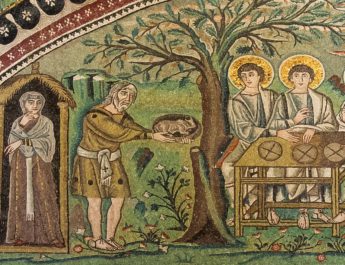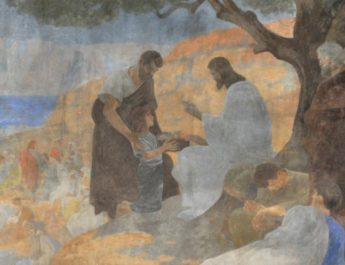Matthew 13:31-33, 44-52
Ordinary A35
31 He put beforeA them anotherB parable:C
A “put before” = paratithemi. 19x in NT – 9x for serving or distributing food, 4x for entrusting, 2x for telling a parable, 2x for commending, 2x for setting forth information. From para (from beside, by the side of, by, beside, in the presence of) + tithemi (to place, lay, set, put, fix, establish). This is to place beside, set before, set before someone as serving a meal, deposit with, entrust, bring forward, and quote as evidence. Properly, to set before, near, or next to. Figurative for entrusting. Presenting food or truth.
B “another” = allos. Other, another, more. This word means another of the same kind or similar type. There is a different word in Greek for another of a distinct or different kind.
C “parable” = parabole. From paraballo (literally to throw beside, compare, arrive, liken); {from para (by, beside, in the presence of) + ballo (to throw, cast, place, put, drop)}. This is a parable, comparison, adage. Quite often a tale told or a metaphor to establish a point, but it could be a true story.
“The kingdomD of heavenE is like a mustardF seedG that someoneH took and sowedI in his field;J
D “kingdom” = basileia. From basileus (king, emperor, sovereign); probably from basis (step, hence foot; a pace); from baino (to walk, to go). This is kingdom, rule, authority, sovereignty, royalty, a realm.
E “heaven” = ouranos. May be related to oros (mountain, hill) with the notion of height. This is the air, the sky, the atmosphere, and heaven. It is the sky that is visible and the spiritual heaven where God dwells. Heaven implies happiness, power, and eternity.
F “mustard” = sinapi. 5x in NT – 3x in Parable of the Mustard Seed, 2x in faith the size of a mustard seed. This word is of Egyptian origin, but may be related to sinomai (to hurt, to sting).
G “seed” = kokkos. 7x in NT – 3x for the Parable of the Mustard Seed, 2x for faith the size of a mustard seed, 1x for a grain of wheat falling to the earth and dies to bear much fruit, and 1x of the resurrection body – what you sow, the bare seed is not what rises. This word is grain, kernel, seed, or corn.
H “someone” = anthropos. This is human, gender not specified.
I “sowed” = speiro. To sow a seed, spread, scatter. Can be used literally or figuratively.
J “field” = agros. May be from ago (lead, bring, carry, guide, go). This word is a field, especially one in which crops are planted or to which one drives cattle. It refers to the country – a farm or hamlet. Additionally, it can be a plot of land.
32 it is the smallestK, L of all the seeds,M but when it has grown it is the greatestN of shrubsO
K “smallest” = mikros. This word is small, little, least, or less. So, this can mean small in size, quantity, number or figuratively of dignity. This word is where all of our micro- words come from.
L {untranslated} = men. This word is truly, indeed, in fact, or verily.
M “seeds” = sperma. Related to “sowed” in v31. From speiro (see note I above). This is that which is sown, a seed, offspring, and includes sperm or a remnant. This is, unsurprisingly, where the English word “sperm” comes from.
N “greatest” = megas. Great, large, exceeding – great or big in many senses literally and figuratively. This is also where all our mega- words come from.
O “shrubs” = lachanon. 4x in NT – 2x in the Parable of the Mustard seed, 1x when Jesus denounces the pharisees and lawyers saying that they tithe mint and rue and herbs of all kinds, and 1x when Paul says that the weak eat only vegetables. From lachaino (to dig). This is a garden herb, a vegetable, a garden plant.
and becomesP a tree, so thatQ the birdsR of the airS come and make nestsT in its branches.”U
P “becomes” = ginomai. This is to come into being, to happen, become, be born; to emerge from one state or condition to another. This is coming into being with the sense of movement or growth.
Q “so that” = hoste. From hos (as, like as, when, since); {from hos (who, which, what,that)} + te (and, both, and both). This word is so as to, so then, therefore, so that. This connects cause to the necessary effect following from it. It emphasizes the importance of the result.
R “birds” = peteinon. 14x in NT. From petomai (to fly). This is winged, bird, fowl.
S “air” = ouranos. Same word as “heaven” in v10. See note E above.
T “make nests” = kataskenoo. 4x in NT – 3x in Parable of the Mustard Seed, and 1x in Peter’s speech – my flesh will live in hope. From kata (down, against, sccording to, throughout, among) + skenoo (to have one’s tent, dwell, encamp, have a tabernacle; to pitch or live in a tent; fig. to occupy or to reside as God did in the Tabernacle); {from skenos (a tent, tabernacle; fig. for the body; a hut or temporary residence; human body as abode for the spirit); from skene (a tent, booth, tabernacle, abode, dwelling, mansion, habitation, cloth hut)}. This is to pitch one’s tent, encamp, dwell, and can be used for tabernacle. Figuratively, it is to remain, lodge, or rest.
U “branches” = klados. 11x in NT – 5x in the root and branches being grafted in section of Romans, 3x in Parable of the Mustard Seed, 2x in the Lesson of the fig tree where as soon as the branch puts forth leaves you know summer is near, 1x for Palm Sunday when the crowd cut branches from the trees. From klao (to break in pieces – often used specifically for breaking bread). This word is branch, descendants, young shoot. A twig or bough as if broken off.
33 He told them another parable: “The kingdom of heaven is like yeastV that a womanW took and mixedX in with three measuresY of flourZ until allAA of it was leavened.”BB
V “yeast” = zume. 13x in NT. Perhaps from zeo (to boil, be hot, ferment, bubble, boil, or glow; used figuratively for being fervent or earnest). This is yeast in a literal or figurative sense – an influence that grows, but is not easily detected.
W “woman” = gune. Perhaps related to “becomes” in v32. Perhaps from ginomai (see note P above). This is woman, wife, or bride. This is where the word “gynecologist” comes from.
X “mixed” = egkrupto. 2x in NT. From en (in, on, at, by, with, among) + krupto (to hide by covering, secret, hidden things). This is to hide in, mix with, or conceal in.
Y “measures” = saton. 2x in NT. From Aramaic; compare Hebrew seah (seah – a dry measure used for grain; root may mean to define). This is a dry unit of measure about one and a half pecks or 12 metric liters.
Z “flour” = aleuron. 2x in NT. From aleo (to grind). This is meal or wheat flour.
AA “all” = holos. This is whole, complete, or entire. It is a state where every member is present and functioning in concert. This is the root of the word “whole.”
BB “leavened” = zumoo. Related to “yeast” in v33. 4x in NT. From zume (see note V above). This is to leaven or ferment – to mix in yeast.
44 “The kingdom of heaven is like treasureCC hiddenDD in a field, which someone foundEE and hid; then in his joyFF he goesGG and sells all that he has and buysHH that field.
CC “treasure” = thesauros. Related to “put before” in v31. 17x in NT. From the same as tithemi (see note A above). This is treasure, storehouse, deposit. It is wealth in a literal or figurative sense. It is where the word “thesaurus” comes from.
DD “hidden” = krupto. Related to “mixed” in v33. 18x in NT. See note X above.
EE “found” = heurisko. This is to find, learn, or obtain. It is to discover something, which generally implies a period of searching for it. This is to find in a literal or figurative sense. This is where the word “heuristic” comes from.
FF “joy” = chara. From chairo (to rejoice, be glad or cheerful; a greeting); from char– (to extend favor, lean towards, be inclined to be favorable towards). This is joy, delight, gladness. Can be understood as the feeling you get when you are aware of grace.
GG “goes” = hupago. Perhaps related to “field” in v31. From hupo (by, under, under the authority of) + ago (see note J above). This is to lead under so to depart, go away, or die. It is to lead away under the command of someone else, being given a mission or objective to carry out.
HH “buys” = agorazo. From agora (assembly, forum, marketplace, town square, thoroughfare); from ageiro (to gather). This is to go and buy something at market with a focus on goods being transferred. It can also mean to purchase or redeem.
45 “Again, the kingdom of heaven is like a merchantII in search ofJJ fineKK pearls;LL 46 on finding one pearl of great value,MM he went and soldNN all that he had and bought it.
II “merchant” = emporos. 5x in NT. From en (in, on, at, by, with, among) + the base of poreuomai (to go, travel, journey; transportation something from one place to another; focuses on the personal meaning given to getting to the destination); {from poros (passageway, ford)}. This is a merchant or trader. It can refer specifically to one who travels by ship or more broadly one journeying. This is where the word “emporium” comes from.
JJ “in search of” = zeteo. This is to seek, search for, desire. It is searching for something by inquiring or investigation. It can be seek in a literal or figurative sense. There is a Hebrew figure of speech “to seek God’s face” so it can also mean to worship God. Alternately, you could seek someone’s life i.e. plot to kill them.
KK “fine” = kalos. This is good, noble, beautiful, correct, or worthy. This is external signs of goodness like beauty, demonstrations of honorable character, showing moral virtues. A different word, agathos, speaks of intrinsic good.
LL “pearls” = margarites. 9x in NT. “Borrowed from Iranian. Compare Middle Persian mwlwʾlyt’ (morwārīd) (whence Persian مروارید (marvārīd)), Sogdian (marγārt), Sanskrit मञ्जरी (mañjarī), and Avestan (mərəya).” OR from margaros (a pearl oyster). This is a pearl. It is where the name “Margarite” comes from. See https://en.wiktionary.org/wiki/%CE%BC%CE%B1%CF%81%CE%B3%CE%B1%CF%81%CE%AF%CF%84%CE%B7%CF%82#Ancient_Greek
MM “great value” = polutimos. 3x in NT– including the pearl of great price in Matthew 13:46. From polus (much, many, abundant) + time (worth or something’s perceived value; literally, price, but figuratively, the honor or value one sees in someone or something else; also esteem or dignity; also precious or valuables); {From tino (to pay, be punished, pay a penalty or fine because of a crime); from tio (to pay respect, value)}. This is very precious, valuable, or costly.
NN “sold” = piprasko. 9x in NT. From pernemi (to sell by export). This is to sell with travel involved. It can also mean to sell into slavery or to be devoted to.
47 “Again, the kingdom of heaven is like a netOO that was thrownPP into the seaQQ and caughtRR fish of every kind;SS
OO “net” = sagene. 1x in NT. Perhaps from satto (to equip). This is not a typical casting net, but a larger one – a dragnet or seine. It can also be the netted rope of a pack saddle. This is the root of the word “seine” in English.
PP “thrown” = ballo. Related to “parable” in v31. See note C above.
QQ “sea” = thalassa. Perhaps from hals (sea, salt, a boy of saltwater) or halas (salt; can be figurative for prudence). This is the sea, a lake, or seashore.
RR “caught” = sunago. Perhaps related to “field” in v31 & related to “goes” in v44. From sun (with, together with) + ago (see note J above). This is to lead together and so to assemble, bring together, welcome with hospitality, or entertain. In the sense of assembly, this is the root of the word “synagogue.”
SS “kind” = genos. Perhaps related to “becomes” in v32 & “woman” in v33. From ginomai (see note P above). This is family, offspring, kin – in a literal or figurative sense.
48 when it was full,TT they drewUU it ashore,VV sat down,WW and putXX the goodYY into baskets but threw out the bad.ZZ
TT “was full” = pleroo. From pleres (to be full, complete, abounding in, occupied with). This is to fill, make full or complete. Properly, this is filling something up to the maximum extent that it can be filled – an appropriate amount for its individual capacity. So, this is used figuratively for furnish, influence, satisfy, finish, preach, perfect, and fulfill.
UU “drew” = anabibazo. 1x in NT. From anabaino (to go up, rise, climb, mount; to go up in a literal or figurative sense); {from ana (up, again, back, among, anew) + the same as basis (step, hence foot; a pace); from baino (to walk, to go)}}. This is to draw up or bring up. So, it can mean to haul a net in or drag it to shore.
VV “ashore” = epi + ho + aigialos. Literally “upon the shore.” Aigalos is perhaps related to “sea” in v47. 6x in NT. From aix (a wave) OR from aisso (to rush) + hals (see note QQ above). This is seashore, beach, land. It is a seacoast with waves.
WW “sat down” = kathizo. From kathezomai (to sit down, be seated); {from kata (down, against, according to, among) + hezomai (to sit); {from aphedron (a seat, a base)}}. This is to sit, set, appoint, stay, rest.
XX “put” = sullego. 8x in NT. From sun (with, together with) + lego (to speak, tell, mention). This is to gather up or gather together.
YY “good” = kalos. Same as “fine” in v45. See note KK above.
ZZ “bad” = sapros. 8x in NT. From sepo (to putrefy, cause to rot; figuratively, to perish or to make something corrupt). This is rotten, worthless, corrupt, bad, or unwholesome. It is rotten and hence of poor quality and hence not good for use and so worthless in a literal and figurative (moral) sense. This is someone who previously embodied a virtue, but has fallen into sin.
49 So it will be at the endAAA of the age.BBB The angelsCCC will come out
AAA “end” = sunteleia. 6x in NT. From sunteleo (to fulfill, accomplish, complete, bring to the desired result, to complete a goal literally or figuratively); {from sun (with, together with) + teleo (to complete, fulfill, accomplish, end); from telos (an end, aim, purpose, completion, end goal, consummation, tax; going through the steps to complete a stage or phase and then moving on to the next one)}}. This is completion, end, consummation – joint action or joint payment.
BBB “age” = aion. From the same as aei (ever, always, unceasingly, perpetually; on every occasion). This is an age, cycle of time, course, continued duration. It is also used to describe the eternal or forever. This is the word used to discuss the present age or the messianic age.
CCC “angels” = aggelos. Perhaps related to “field” in v31 & related to “goes” in v44 & “caught” in v47. Probably from ago (see note J above) + agele (flock, herd, drove); {also from ago (see above)}. This is angel or messenger. Properly, it is one sent with news or to perform a specific task. This messenger can be human or an angel from heaven. More commonly, it is used for angels in the New Testament.
and separateDDD the evilEEE fromFFF the righteousGGG 50 and throw them into the furnace of fire, where there will be weepingHHH and gnashingIII of teeth.
51 “Have you understoodJJJ all this?”
They answered, “Yes.”
DDD “separate” = aphorizo. 10x in NT. From apo (from, away from) + horizo (to determine, set boundaries, appoint, designate, pre-determined; literally, this is setting horizons); {from the same as horion (boundary, territory); from horos (limit, boundary)}. This is to set off by a boundary – to divide, separate, exclude. It can also mean ostracize or keep aloof.
EEE “evil” = poneros. From poneo (to toil); related to ponos (pain, trouble, labor, distress, suffering; toil, which implies anguish); from the base of penes (a laborer, poor person, starving or indigent person; someone who works for their living); from pernomai (working for a living; laborer, poor person; to work for daily bread); from peno (to toil to survive day by day). This is bad, evil, wicked, malicious, grievous, or toilsome. Properly, it is something that bears pain – it emphasizes the miseries and pains that come with evil. By contrast, the Greek kakos refers to evil as part of someone’s core character. Also contrasting the Greek sapros, which deals with falling away from a previously embodied virtue. This word can mean ill, diseased, morally culpable, derelict, vicious, malicious, or guilt. It can also refer to the devil or sinners.
FFF “from” = ek + mesos. Literally “from the midst of the.”
GGG “righteous” = dikaios. From dike (the principle of justice; that which is right in a way that is very clear; a decision or the execution of that decision; originally, this word was for custom or usage; evolved to include the process of law, judicial hearing, execution of sentence, penalty, and even vengeance; more commonly, it refers to what is right); may be from deiknumi (to show, point out, exhibit; figurative for teach, demonstrate, make known). This is correct, righteous, just, or a righteous person. It implies innocent or conforming to God’s standard of justice.
HHH “weeping” = klauthmos. 9x in NT. From klaio (to weep, lament, or sob; weeping aloud). This is weeping, lamentation, shrieks, intense pain.
III “gnashing” = brugmos. 7x in NT. From brucho (to bite, grind, grate teeth – in rage or pain). This is biting, grinding, grating teeth.
JJJ “understood” = suniemi. From sun (with, together with, having association, joined close together) + hiemi (to put, send). This is properly to put it together – joining facts or ideas into an understandable whole, synthesizing to get a final understanding of the matter and also how it applies to life. In the New Testament, to understand implied living piously.
52 And he said to them, “Therefore every scribeKKK who has been trainedLLL for the kingdom of heaven is like the master of a householdMMM who bringsNNN out of his treasure what is newOOO and what is old.”PPP
KKK “scribe” = grammateus. From grapho (to write, stand written). This is a write or scribe, a professional – can include a secretary, a town clerk, or a Jewish religious scribe trained in the Law. This word can be used of a person of learning broadly speaking. It is important to note that scribes had some standing and a place of respect in society. Thus, Jesus challenges them precisely because the hope and expectation of their goodness is higher than it is for other people. Here, he makes a positive comment about them and their welcome position within the community of the followers of Jesus.
LLL “trained” = matheteuo. 4x in NT. This could also be translated “scribes discipled for the kingdom of heaven.” This word is being or making a disciple, training in discipleship, enrolled as a scholar, or generally instructed.
MMM “master of a household” = anthropos + oidodespotes. Literally “a person, master of a household.” Oidodespotes is 12x in NT. From oikos (house, dwelling – the building or the family, lineage, nation, the Temple) + despotes (lord, master, prince – an authority people with complete jurisdiction and unrestricted power); {perhaps from deo (to tie, bind, fasten, impel, compel; declare prohibited and unlawful) + posis (husband)}. This is the master of the house, head of the house, head of the family. The word despotes is sometimes applied to Jesus and God and so we should not assume the negativity of the English word derived from it – despot.
NNN “brings” = ekballo. Related to “parable” in v31 & “thrown” in v47. From ek (from, from out of) + ballo (see note C above). This is to eject literally or figuratively – to throw put out, bring forth, or produce.
OOO “new” = kainos. Properly, new in quality like something that is innovative – a fresh development or opportunity. There is a different word in Greek (neos) that refers to new in contrast to what is old. So, this word is fresh, unused, novel.
PPP “old” = palaios. 19x in NT. From palai (long ago, of old, in times past, former); probably another form for palin (back of place, again of time, further). This word is old, ancient, antique, worn out.
Image credit: “Pearl from Pinctada maxima” by James St. John




